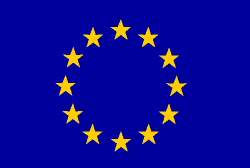 Join us for April Book Readings:
Join us for April Book Readings:
April 23rd at 6:30pm at the Carnegie Library in Oakland in the South Wing Reading Room
About the EUPL
The European Commission, which acts as the executive branch of the EU, funds the EU Prize for Literature through the Commission’s Creative Europe program, which aims to recognize European art and talent and promote international discussion. The prize is awarded to each of the twelve nations participating in the contest that year. Of the thirty-six total member states in the program, twelve nations are eligible each year for judging, allowing all states and languages to be recognized throughout a cycle of three years. The prize requires winning books to come from established authors, not be translated into more than three languages, and to be the author’s most recent work. Winning books are selected by National Juries chosen by several intra-Europe publishing and editing councils. Find more information here.

About the Author
Marente de Moor was the Dutch recipient of the prize in 2014 for her novel De Nederlandse maagd (The Dutch Maiden in English). Published in 2010, De Nederlandse maagd is her second novel, and received the AKO Literatuurprijs, the best known prize for literature in the Netherlands. The book follows a young Dutch girl and her relationship with a mentor in interwar Germany. Dutch and foreign presses describe the novel as “whirling” and “animalistic”, and compare it to the likes of Tolstoy and Jünger. De Moor has authored several award-winning novels and short stories in addition to De Nederlandse maagd, and has had her work translated into ten languages. Her third novel, The Roundhay gardenscene, was shortlisted for the Libris Prize for Literature. Learn more about de Moor on her website.
Photo © juergen-bauer.com
Photos




Explore the EUPL
Please take note of the anthologies dating back to 2009 on this page.
Some ideas to ponder as you investigate:
- Why does the EU give this prize?
- What are the stated goals of the prize and what might be some of the unstated objectives?
- What types of texts seem to be privileged here and which excluded? Why?
- What kind of authors are privileged and which excluded? Why?
- Does anything surprise you about this award? What seems predictable?
- How does the EU Prize for Literature resemble and differ from other existing literary prizes?
- Which of these winning texts since 2009 can actually be readily found in the US?
- Are there any works featured here that you would be interested in reading? Which ones and why do they look good?
Receive Copies for Your Book Club
Contact Iris Matijevic, to receive a few free copies of the novel or win a copy of the book on our Facebook and Instagram contest, every Wednesday and Friday. We will post a photo of the book around campus and the first person to correctly identify where the photos was taken, will win a copy of the book!
This visit has been made possible in partnerhship with the Center for European Studies at UNC-Chapel Hill through the Getting to Know Europe Grant. Please visit UNC's website for more on Ms. de Moor's visits to our Centers by following the link below.
https://europe.unc.edu/eu-prize-for-literature/
“About the EUPL” and “About the Author” sections written by Mary Drue, an Excel@Carolina student in the EURO-TAM program, at UNC-Chapel Hill Center for European Studies.

Funding provided by the International and Foreign Language Education (IFLE) office of the U.S. Department of Education and through a Getting to Know Europe Grant provided by the EU Delegation to the U.S. in partnership with the Center for European Studies at the University of North Carolina, Chapel-Hill.
